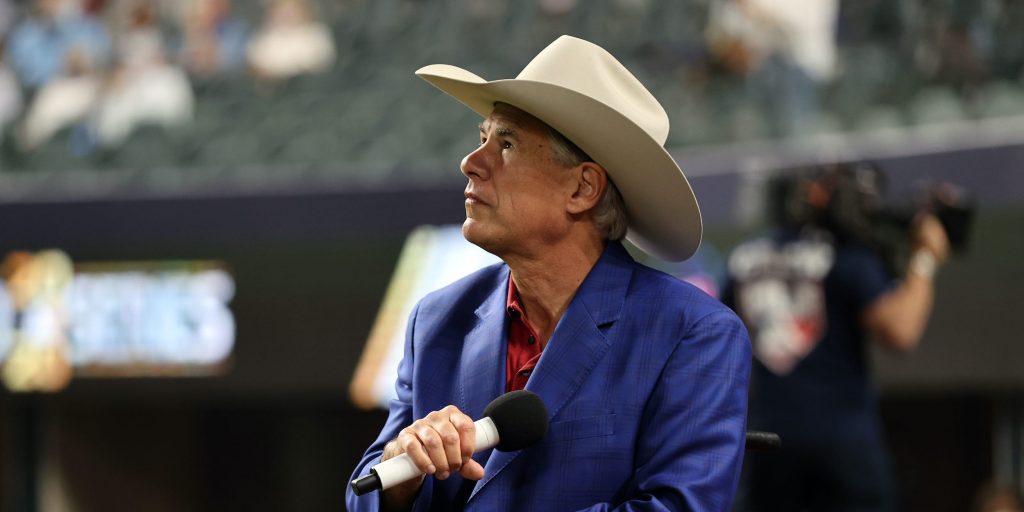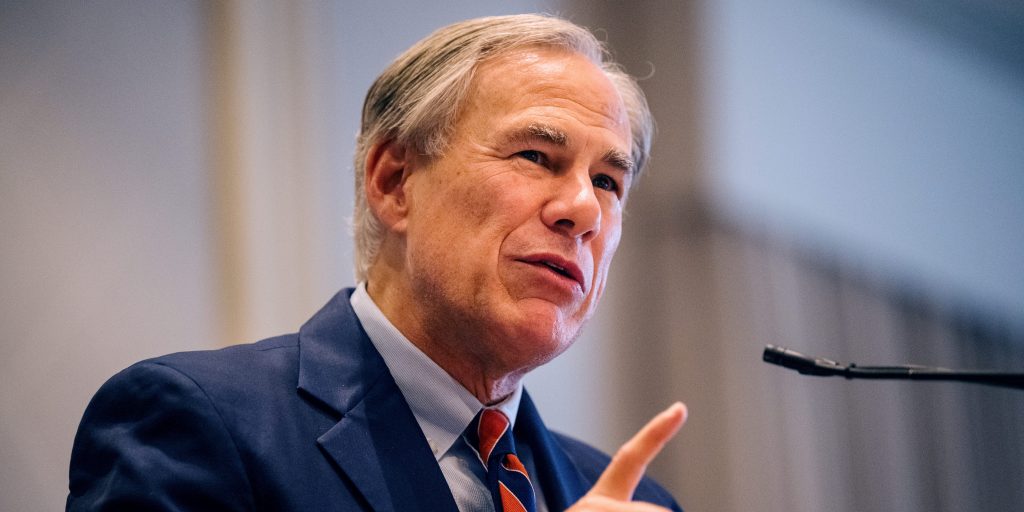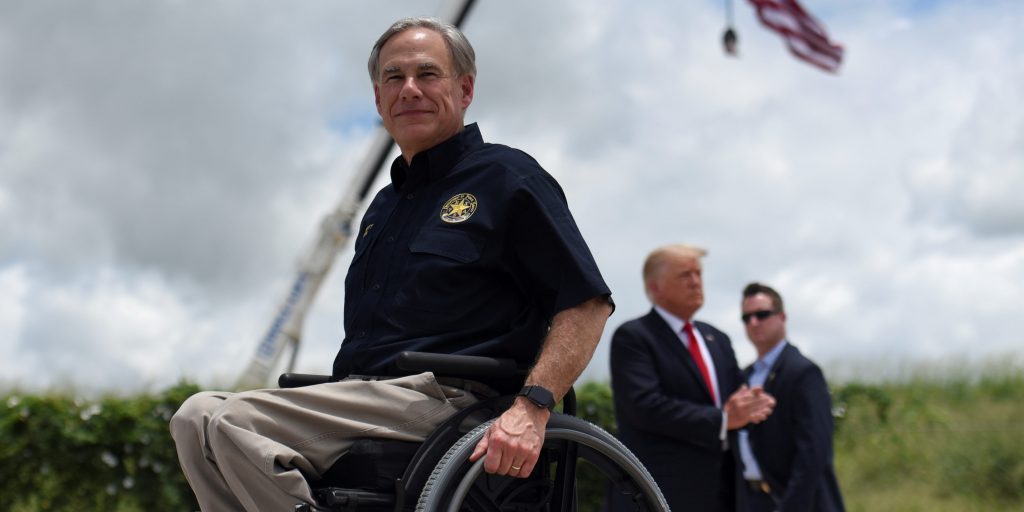- The school shooting in Uvalde wasn't the first gun tragedy Texas Gov. Greg Abbott has faced.
- There have been six mass shootings in Texas during the Republican lawmaker's two terms as governor.
- Insider delved into Abbott's background, beliefs, and tenure as the Lone Star State's leader.
The state of Texas is top of mind this week following a mass shooting at an elementary school in the small town of Uvalde that left 21 people dead, including 19 young children.
Amid the chaos of Tuesday's tragedy, it was Gov. Greg Abbott who first reported the unfathomable news that scores of children were gunned down in their classroom by an 18-year-old shooter.
The Republican governor has remained visible in the immediate aftermath of the incident, sitting center stage at a Wednesday press conference where he fought off accusations from political rivals and pivoted the conversation away from gun control.
Elected in 2014 as a staunch Texas conservative, Abbott has spent the last seven years in near-constant crisis mode, fielding the state's response to several mass shootings, a deadly winter storm, and the COVID-19 pandemic.
Still, his approval ratings suggest that Texans are comfortable, if not satisfied, with his methods. Throughout his two terms, his approval ratings have never dipped below 40% and never peaked beyond 56%.
Abbott's background
A native of the Lone Star State, Abbott's father, a stockbroker and insurance agent, died from a heart attack while Abbott was in high school, local outlet Honest Austin reported. His mother, who was a stay-at-home mom at the time, then rejoined the workforce in the real estate industry.
Abbott earned a bachelor's degree in Business Administration from the University of Texas at Austin in 1981 and a Juris Doctorate from Vanderbilt University Law School in 1984. Shortly after his graduation from Vanderbilt, a 26-year-old Abbott was left paralyzed from the waist down after an oak tree fell on him during a jog.
He continued his career in the Texas judiciary branch, starting in private practice and then moving to become a state trial judge in 1993.
Then-Texas Governor George W. Bush appointed Abbott to the Texas Supreme Court in 1996.
His legal career continued as he served as the Texas attorney general from 2002 to 2015 — where he filed over 30 lawsuits against former President Barack Obama. Having been re-elected twice, he was the state's longest-serving attorney general before winning in the 2014 gubernatorial election.
Dubbed the "Best Governor in the Nation" in 2020 by Laffer Associates and the American Legislative Exchange Council, Abbott has now served two terms as the state's governor and is seeking a third.
Abbott married his wife, Cecilia, in 1981. Cecilia, a former school teacher, is recognized as the first Hispanic First Lady of Texas. The two have a daughter together named Audrey, a 2020 graduate of the University of Southern California.
Political beliefs
Abbott holds a host of traditional conservative values — including an unwavering faith in the Second Amendment and a no-exceptions stance toward abortion.
The state has loosened its gun laws during Abbott's tenure despite recent mass shootings.
"I'm EMBARRASSED: Texas #2 in nation for new gun purchases, behind CALIFORNIA. Let's pick up the pace Texans," Texas Governor Greg Abbott tweeted in October 2015.
The anti-abortion governor also signed one of the most restrictive abortion laws in the country — banning the procedure after six weeks of pregnancy (before many individuals realize they're pregnant) and encouraging private citizens to sue abortion providers for up to $10,000.
The law's only exception will be for medical emergencies. He vowed to "eliminate all rapists" as the anti-abortion law makes no exception for individuals who were raped.
On par with former President Donald Trump, Abbott has sought to eradicate illegal border crossings from Mexico to Texas. He claimed that individuals crossing the border pose "an ongoing and imminent threat of disaster for certain counties and agencies in the State of Texas."
Abbott has also aided in the nationwide conservative effort calling for the banning of books that contain "pornography or obscene content." This has resulted in books that focus on race, gender, and sexuality being stripped from shelves in schools. The Republican governor also pushed forward with a directive to allow state authorities to investigate parents providing their trans children with gender-affirming care for child abuse.— seemingly paradoxical to his call for parental rights.
Controversies and Crises
Throughout his two terms, Abbott has faced numerous state crises and controversies.
Since he was first elected in 2015, Texas has been home to six major mass shootings that have claimed the lives of nearly 100 Texans.
In July 2016, five Dallas police officers were killed in an ambush at a Black Lives Matter protest in the deadliest incident for US law enforcement since the September 11 attacks. The incident came just months after Texas loosened its concealed gun laws, allowing license-holders to openly carry handguns in holsters.
In November 2017, a 26-year-old gunman killed 26 people and wounded 20 others during a church service at the First Baptist Church in Sutherland Springs. The attack remains the deadliest mass shooting in the state's history. Six months later, a 17-year-old killed 10 people, including 8 students at Santa Fe High School.
Two more mass shootings in August 2019 shook the state. First, a 21-year-old suspected shooter killed 23 people at a Walmart in El Paso in a self-proclaimed racist attack. Then, just days later, a 36-year-old suspected shooter killed seven people in a shooting spree in Odessa-Midland.
Abbott responded to the slew of shootings by renewing school safety plans, strengthening law enforcement protections, and convening committees to discuss the rise in mass violence. Meanwhile, the state's gun laws only continued to get laxer.

The governor's penchant for guns has played poorly to some in the aftermath of so many attacks. Abbott, along with his Republican ally former President Donald Trump, are both scheduled to address a National Rifle Association conference on Friday — just 72 hours after the Uvalde shooting. During a Wednesday press conference, the governor declined to say whether he still plans to attend.
But despite Abbott's pro-gun proclivities, the crises he has faced in office have gone beyond shootings.
Abbott's approach to the COVID-19 pandemic was among the most controversial in the country. As the virus ravaged Texas, the governor refused to impose lockdowns or mask mandates and passed an executive order barring government agencies, cities, counties, school districts, and private companies in the state from implementing vaccine mandates. The governor himself is vaccinated against COVID-19 and has encouraged other Texans to get their inoculations.
Abbott again came under fire in February 2021 after a powerful winter storm knocked out power across the state and left more than 200 people dead, the majority from hypothermia. The governor called for an investigation into Texas' electric grid operator, the Electric Reliability Council of Texas (ERCOT) and signed a bill requiring that power companies in the state be ready for future extreme weather events.
But a year after the storm, a former Texas power official testified that Abbott had ordered power prices to remain as high as possible for multiple days during the storm's blackouts in an effort to prevent further rolling blackouts, even as power plants were already starting to turn back on.
And in recent months, the governor has stoked further controversy after he designated gender-affirming care for transgender youth as child abuse. Earlier this year, Abbott called on state agencies to designate the use of gender-affirming care as a form of child abuse, prompting advocates to decry the governors' actions as "monstrous and amoral."
After eight years as Texas governor, Abbott will vie for a third term this fall, facing off against Democratic challenger Beto O'Rourke. The state has no gubernatorial term limits.

